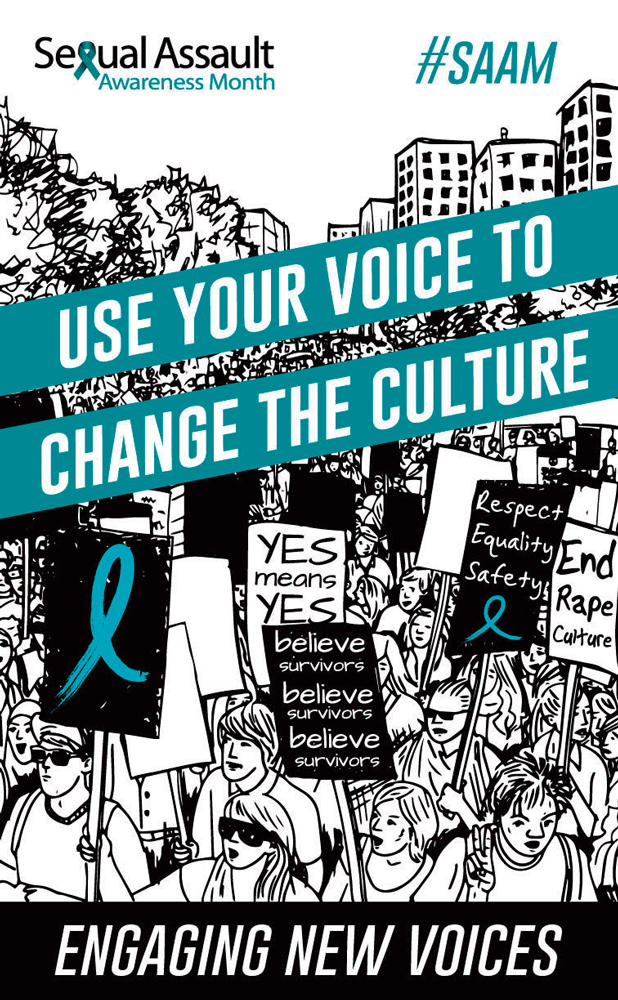
Jack Alegre
Staff Writer
Sexual Assault Awareness Month is a month of reflection on the heinous crimes of rape and sexual assault, as well as a call to action. However, SAAM takes on a particular urgency when used in the collegiate context. With reports of incidences of sexual assault on college campuses making national headlines, SAAM at UCSB is asking students to take an introspective look at college culture, and if or how it may contribute to sexual violence.
According to the Rape, Abuse & Incest National Network, “sexual violence is more prevalent at college, compared to other crimes.” That means that college-attending women ages 18-24 are three times more likely to encounter sexual violence. Roughly 11 percent of the total collegiate population faces sexual violence in some form or other.
SAAM is “necessary on college campuses,” said Alejandra Melgoza, “because of the high rates in which it [sexual violence] occurs.” Melgoza is a fourth year Chican@ studies major who had previously staged a thirteen hour sit-in in solidarity with survivors of sexual violence.
“[SAAM] reminds survivors they are not alone when experiencing the aftermath,” Melgoza said. “It reminds survivors that something is being done to prevent someone else from experiencing the same experience especially during the moments when it feels that no one is talking about the rape culture on our campus.”
Students are not the only ones feeling the need to get involved with SAAM. In order to spread awareness of sexual assault and the damage it causes to both person and campus, a week is dedicated to events meant to elevate the issue to a place of interest. Several local businesses have also been enlisted, such as Woodstock’s, to participate in what is known as the Green Dot Campaign.
According to a press release from UCSB’s Campus Advocacy, Resource and Education office, the campaign allies with “Isla Vista restaurants and bars to empower bystanders to take action and create culture change.” The program is meant to prevent or minimize the damage of sexual assault by training restaurant staff how to recognize acts of sexual violence, thus preventing them from becoming passive bystanders.
CARE’s Acting Director, Briana Conway, also pointed out diverse “campus-based collaborations” that include CARE, Health and Wellness, and the Alcohol and Drug Program, as well as a “Self Care for Activists” program on Apr. 19 and the Take Back the Night rally on Apr. 20.
With reports of incidents of sexual assault on campus on the rise nationwide, the mission of Sexual Assault Awareness Month takes on a darker tone. A sexual assault goes beyond just the initial encounter. The prevalence of incidents in recent years and the many challenges in spreading sexual assault awareness is cause for concern that maybe the problem may be endemic to the system at hand.
According to Melgoza, “Everyone knows it is happening and yet it isn’t until there are faces, stories, and voices to those numbers that people feel the need to mobilize.” The unwillingness to tackle the subject speaks to her of an uncertainty regarding the topic of sexual violence in the first place. For her, it is a question of where and how to begin.
“The approaches have to be sensitive to the emotional trauma survivors have gone through and programs need to address the intersectional identities and the experiences of survivors,” Melgoza said. “Queer folks, Black and Brown folks are often left out of the limelight in discussions of sexual assault, especially in popular mediums.”
That is why it is imperative for institutions such as CARE to implement socially-adept policies and programs. Recognition of Sexual Assault Awareness Month is an attempt to normalize the concept of sexual violence being a complicated and pervasive topic.
CARE recognizes the complexity of approaching the topic. Conway feels that the best way of dealing with the stigma is through informational campaigns like SAAM. “The more prevention education efforts and awareness campaigns that occur on campus, the more empowered survivors are to seek support.”










